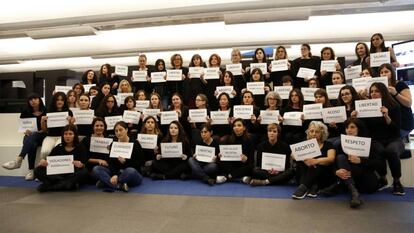On International Women’s Day, Spain plans strikes and more than 500 protests
Following the success of last year’s “8M” demonstrations, stoppages, student walkouts and marches are scheduled across the country today

Spain made world headlines last year when it staged a general strike on March 8, International Women’s Day. Around 5.3 million women observed the walkout, according to the unions, while hundreds of thousands of people joined marches on the streets of 120 Spanish cities that day.
One year later, another “feminist strike” and more than 500 street demonstrations have been called in Spain for today. In Madrid and Barcelona, students are planning a march at noon, and wider demonstrations are scheduled in both cities in the evening.
Organizers are also hoping that students, consumers and caregivers will join the stoppage, in an effort to highlight the crucial role played by women in all sections of society.
The Socialist Party (PSOE) government of Prime Minister Pedro Sánchez said it will “reduce its institutional activity” to just the regular Friday Cabinet meeting. Several ministers are expected to attend the Madrid march this evening to show support for “a society that looks like it is going to mobilize widely,” in the words of Deputy Prime Minister and Equality Minister Carmen Calvo.
The organizers
The strike and many of the demonstrations are being organized by the Comisión 8M (March 8 Commission), made up of feminist assemblies scattered throughout the country. The strike conditions were debated by around 500 groups in the northern city of Gijón in October of last year.
In Madrid, the Comisión 8M has drafted a 29-page document explaining the reasons for the strike and the ultimate goal of “subverting the world order and the pervading hetero-patriarchal, racist and neoliberal rhetoric.”

The report also calls for a new kind of education that excludes “stereotypes about toxic-romantic love,” and demands “feminist training” for judges, police officers and social workers.
The duration of the strike may vary. The two main unions, CC OO and UGT, have backed two-hour stoppages although their branches are free to extend that period. And the smaller CNT, CGT and Confederación Intersindical have called a 24-hour walkout.
A year of change
Some things haven’t changed much in the past year: the salary gap, the glass ceiling, and gender violence are still major issues that face Spain.
But some things have: the far right has made unprecedented inroads and it is making the fight against “radical feminism” one of its signature issues. The emerging far-right Vox party, whose voter base is overwhelmingly male, wants to repeal Spain’s gender-violence legislation, which it views as biased. And an ultraconservative Catholic group called Hazte Oír has been touring a bus around the country featuring Hitler’s face on the side in a campaign against what it describes as “feminazis.”
Organizers want to “subvert the world order and the pervading hetero-patriarchal, racist and neoliberal rhetoric”
With local, regional, national and European elections coming up, and opinion polls showing that many women voters are still undecided, political parties have introduced feminist elements into their campaigns: Ciudadanos now has a “liberal feminist manifesto” and the leftist Unidos Podemos coalition has changed its name to the feminine form, Unidas Podemos.
The conservative Popular Party (PP), in the meantime, has spoken out against “left-wing feminism” and announced that it will not join the main march on Friday because, it claims, it has been co-opted by the left.
Why women at EL PAIS are striking

Last year, in an unprecedented effort to join our voices in protest, more than 8,000 women who work for different media outlets backed a manifesto called Las periodistas paramos (Women journalists strike) in support of the Women's Day stoppage. This year will be no different at newsrooms across Spain. Female workers at EL PAÍS – not all of them journalists – have voted in an assembly to back the protests planned for Friday. We do so in full awareness of our own role in society, which is much more visible than that of other women who will be unable to strike or even join a demonstration today.
We are not normally the subject of news stories ourselves, but on this occasion we want to use our power to get the message across. Some of Spain’s best-known women in television and radio journalism have said they will not go on the air today. And at EL PAÍS, women will take their bylines off their articles, join the strike, and demonstrate on the street in order to demand effective equality and no step backwards in the rights we have fought for and won.
English version by Susana Urra.
Tu suscripción se está usando en otro dispositivo
¿Quieres añadir otro usuario a tu suscripción?
Si continúas leyendo en este dispositivo, no se podrá leer en el otro.
FlechaTu suscripción se está usando en otro dispositivo y solo puedes acceder a EL PAÍS desde un dispositivo a la vez.
Si quieres compartir tu cuenta, cambia tu suscripción a la modalidad Premium, así podrás añadir otro usuario. Cada uno accederá con su propia cuenta de email, lo que os permitirá personalizar vuestra experiencia en EL PAÍS.
¿Tienes una suscripción de empresa? Accede aquí para contratar más cuentas.
En el caso de no saber quién está usando tu cuenta, te recomendamos cambiar tu contraseña aquí.
Si decides continuar compartiendo tu cuenta, este mensaje se mostrará en tu dispositivo y en el de la otra persona que está usando tu cuenta de forma indefinida, afectando a tu experiencia de lectura. Puedes consultar aquí los términos y condiciones de la suscripción digital.








































